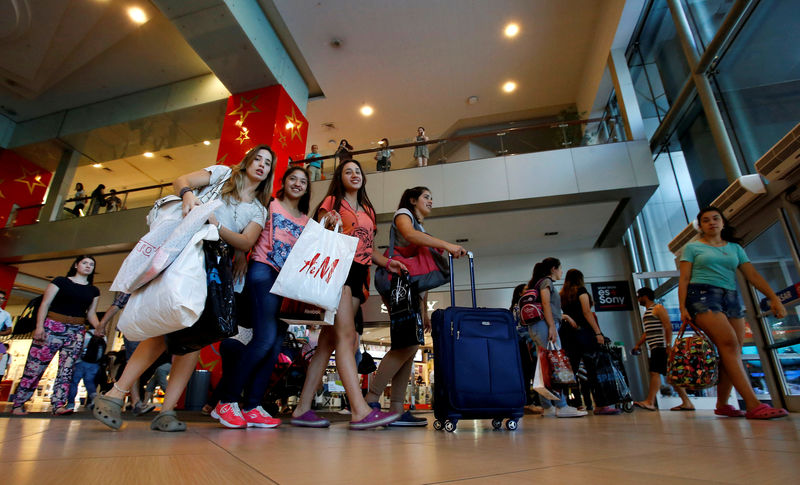By Fabian Cambero
SANTIAGO (Reuters) - The sight of Argentine tourists filling entire suitcases with goods in Chilean shopping malls is no longer as common as it once was.
In recent years, Argentines have crossed the Andes in huge numbers to take advantage of a favorable exchange rate and Chile's more open economy to shop for clothing, footwear and technology that often sells for less than half the price than in stores at home.
But with the Argentine peso tumbling and economic crisis at home deepening, visits by Argentines to Chile have fallen sharply. Visits dropped nearly 50 percent in the first half of this year to 887,769 people, compared to 1.63 million in the same period of 2018, official figures from the department of tourism showed.
Tourist numbers dropped 20 percent in July alone, year-on-year.
"The situation in Argentina is impacting the entire region," Chile's Tourism Undersecretary Monica Zalaquett told Reuters.
Since many were on "shopping tourism" trips, the drop was also reflected in a decline in spending on international credit cards in Chile, which fell by 11.5 percent between January and June 2019, according to government figures.
"We traveled because we had already bought the tickets, but we are trying to spend as little as possible," said Silvana Blanco, a Buenos Aires office worker restricting herself to window shopping at Santiago's large Costanera Center last weekend.
Earlier this month, Peronist opposition candidate Alberto Fernandez drubbed incumbent President Mauricio Macri in primary elections ahead of a general election in October.
That led to another tumble in the peso - and more bad news for Santiago store owners. A year ago, one Argentine peso could buy 22 of its Chilean counterparts. This week, it was worth around 13.
Among tourists in Chile, Argentines have traditionally been the biggest spenders, followed by Brazilians.
"The Argentine market represents 40-45 percent of tourist visits to Chile," said Lorena Arriagada, general secretary of the Chilean Association of Tourism Companies.
"I think those that felt this most were the shopping centers."
Santiago's Chamber of Commerce said it hoped Argentine shoppers would still spend $550 million this year - 0.7 percent of retail sales, compared to 1.3 percent in 2016 and 2017.
The drop in cross-Andean visitors had "obviously affected growth in the sector and complicated the scenario," said George Lever, the chamber of commerce's head of studies.

Cencosud (SN:CENCOSUD) and Falabella (SN:FALABELLA), Chile's largest retail and shopping center operators, declined to comment.